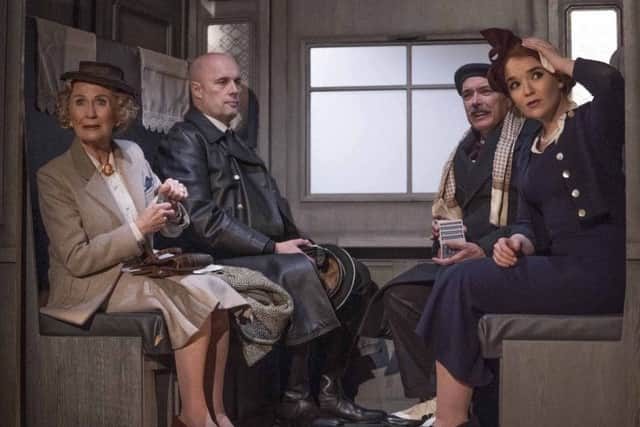Theatre reviews: Jersey Boys | The Lady Vanishes | A Respectable Widow Takes To Vulgarity


Playhouse, Edinburgh **** | King’s Theatre, Edinburgh *** | Oran Mor, Glasgow ****
In a sense, Jersey Boys is not an easy show for any 21st century woman to watch. It harks back to a time when men ran the world, and women appeared only as sainted mothers, nagging wives, or decorative features of the boys’ nights on the town. Yet there’s something so truthful about the story told in this 2005 musical, with book by Marshall Brickman and Rick Elice, and music by original Four Seasons member Bob Gaudio, that it makes for a completely gripping piece of theatre, alternating between live action and monologues by each of the band members, and lifted into pure joy by the band’s astonishing play-list of hits, from their first US number one Sherry, to the iconic December 1963 (Oh What A Night).
Advertisement
Hide AdAdvertisement
Hide AdMichael Watson turns in a remarkable central performance as Frankie, alongside Bailey’s Tommy, Declan Egan’s towering Bob Gaudio, and Lewis Griffiths’s long-suffering Nick Massi; and with Francis Goodhand’s six-piece orchestra delivering magnificent support, the show thunders along through a story which demonstrates the sheer popular power of white working-class music in America, and the truth of the saying that a working-class hero is something to be, both at the best of times, and at those moments when the journey seems too difficult to bear.


At the King’s Theatre, meanwhile, the Classic Thriller Theatre Company presents The Lady Vanishes, based on the great 1938 film by Alfred Hitchcock, and starring the completely charming Juliet Mills as the mysterious Miss Froy, whose sudden disappearance during a train journey from Austria to Switzerland is the subject of the story.
In a sense, The Lady Vanishes is one of those shows that seems to have sprung fully-formed from Britain’s Brexit subconscious; indeed if anyone wants to understand the psychology of this current moment in history they could do worse than deconstruct the layers of national myth-making in this tale of a band of plucky Brits abroad instinctively resisting the evil plots of a bunch of Nazi foreigners. Yet the 12-strong cast deliver the story with spirit and verve, with Lorna Fitzgerald and Matt Barber particularly appealing as the central young couple, Iris and Max; and if you are in the mood for an old-fashioned, slightly creaky but highly entertaining night at the theatre, then The Lady Vanishes certainly fits the bill, as it continues a UK-wide tour.
It’s a far cry from the Lady Vanishes to the wickedly postmodern world of Scottish playwright Douglas Maxwell, whose short comedy A Respectable Widow Takes To Vulgarity is celebrated this week in A Play, A Pie And A Pint’s 500-play anniversary season. Maxwell’s heroine Annabelle is a British establishment figure all right; the wife of a wealthy Scottish manufacturer who has just died, leaving her not only bereft, but bored to tears by the golf club types with whom she is expected to indulge in small-talk.
Her life becomes more interesting, though, when she strikes up a friendship with young apprentice Jim, after he genially calls her husband “a good old c**t” while offering his condolences; and what follows is a brilliantly observant piece about class and register, loneliness and language, that leads Annabelle into places – both literal and emotional –she never previously dreamed of visiting. In April Chamberlain’s new production, Anne Kidd is excellent as Annabelle and young Craig McLean an absolute master of comic timing and tone as Jim; in a perfectly-polished little gem of Scottish theatre that’s well worth remembering, exactly six years on from its first outing at Oran Mor, in 2013.
JOYCE MCMILLAN
Jersey Boys, Playhouse, Edinburgh, until 2 March; The Lady Vanishes, King’s, Edinburgh, today, in Inverness next month.